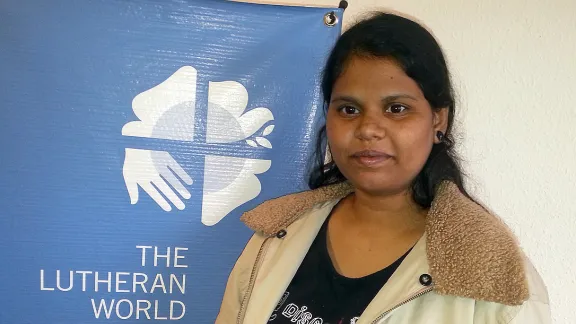
Ms Chrisida Nithyakalyani, UELCI youth secretary. Photo: LWF/P. Mumia
Interview with UELCI Youth Secretary Chrisida Nithyakalyani
(LWI) – Youth leadership development programs run by Lutheran churches in India are equipping young people with skills that help communities take up issues of climate change, and help students in career development. Ms Chrisida Nithyakalyani, youth secretary for the United Evangelical Lutheran Churches in India (UELCI) looks at some of the initiatives supported by The Lutheran World Federation (LWF) through its Department for Mission and Development (DMD).
Why is youth empowerment important in the Indian Lutheran churches and wider society?
The most precious resource of any nation is a prospective, potential and productive youth, an asset that is abundant in India’s diversity of young faces, comprising 65 per cent of the country’s 1.2 billion people. They are not only the future but they are the present leaders and pillars of the church and the society. However, even though their presence is required in the decision-making and leadership processes, they are often silenced from presenting their views, insights and observations and assume a passive role of being only ‘listeners.’ Hence, it is important that young people have space in the churches where they can raise their voice.
Which are some of the issues that you have actively taken up as UELCI youth to strengthen progress in society?
Through the UELCI Youth Desk, youth secretaries of the eleven LWF member churches [in India] help the young people engage in creative skills that encourage them to overcome challenges such as poverty, climate change impact on vulnerable communities, and speaking out on violence against women.
Our youth leadership development programs for the member churches in four regions (Tamil, Telugu, Hindi I and Hindi II) target 25 youth, both male and female, resulting in the training of 100 young people annually. They learn skills to define strategies; set goals and achieve results; how to ensure accountability and transparency; and the practical implications of taking leadership and participation in churches. The trained youth serve as trainers of more youth in their home congregations. In one session, Ms Amita George from the Evangelical Lutheran Church in Madhya Pradesh said: “Leadership is not an authority or holding position; instead it is an opportunity to listen to and respect the voiceless.” Benison Kachhap, a male participant from the Gossner Evangelical Lutheran Church in Chotanagpur and Assam said: “Youth leadership involves working with all the age groups of a congregation at the grassroots level and filling the generation gap through intergenerational working.”
We are also a vibrant communion towards a greener future, as we take up the issue of climate change and eco-justice seriously. We organize climate change awareness programs at national and regional levels and take up practical measures such as tree planting and ‘youth gardens’. We also engage in observing important days such as World Water Day [22 March] by providing worship resource materials and raising awareness on the need to preserve water for sustainable development.
Since 2014, as part of the second phase of the youth empowerment project, we offer career guidance and counseling programs. The training includes ‘employability’ skills and information sharing on government welfare schemes such as scholarships, and job search strategies including preparation of curriculum vitae and facing interview processes.
In a recent career development session, Ms Premlata Baskey, an undergraduate student at S. P. Mahila College, in Dumka, Jharkhand, said: “The mock interview helped me to get rid of my fears and gave me an idea of how an interview would be as I am a fresher. I am sure that I can attend an interview with confidence, which will be helpful for my future.”
What are some of the challenges you face in carrying out such tasks?
One of the challenges we face is that the leadership training and skills given to the participants are not always put to use by the member churches. Young people should be encouraged to take up leadership roles. The churches need to provide opportunities.
What have you learned from your leadership role in UELCI, and how has it helped you grow as an individual?
As a young person, I have enjoyed great experiences and exposure in this journey with youth in the UELCI member churches. It has helped me to know about the reality of Indian youth and their skills at grassroots level.
As an individual, I have grown as a young leader in a national organization [since 2013]. . My engagement with the ecumenical movement has grown by networking with national partners like the National Council of Churches in India, globally with the LWF and World Council of Churches (WCC) where I represent the Indian Lutheran churches on the Commission on Ecumenical Education and Formation (EEF/WCC).
(The UELCI comprises 11 LWF member churches representing around 4 million Lutherans.)


